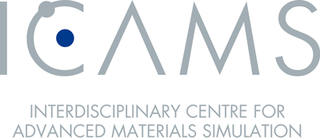
IDEF, initially abbreviation of ICAM Definition, renamed in 1999 as Integration DEFinition, refers to a family of modeling languages in the field of systems and software engineering. They cover a wide range of uses, from functional modeling to data, simulation, object-oriented analysis/design and knowledge acquisition. These "definition languages" were developed under funding from U.S. Air Force and although still most commonly used by them, as well as other military and United States Department of Defense (DoD) agencies, are in the public domain.

In molecular biology, intercellular adhesion molecules (ICAMs) and vascular cell adhesion molecule-1 (VCAM-1) are part of the immunoglobulin superfamily. They are important in inflammation, immune responses and in intracellular signalling events. The ICAM family consists of five members, designated ICAM-1 to ICAM-5. They are known to bind to leucocyte integrins CD11/CD18 such as LFA-1 and Macrophage-1 antigen, during inflammation and in immune responses. In addition, ICAMs may exist in soluble forms in human plasma, due to activation and proteolysis mechanisms at cell surfaces.

Integrated Computer-Aided Manufacturing (ICAM) is a US Air Force program that develops tools, techniques, and processes to support manufacturing integration. It influenced the computer-integrated manufacturing (CIM) and computer-aided manufacturing (CAM) project efforts of many companies.
The ICAM program was founded in 1976 and initiative managed by the US Air Force at Wright-Patterson as a part of their technology modernization efforts. The program initiated the development a series of standard for modeling and analysis in management and business improvement, called Integrated Definitions, short IDEFs.

IDEF0, a compound acronym, is a function modeling methodology for describing manufacturing functions, which offers a functional modeling language for the analysis, development, reengineering, and integration of information systems; business processes; or software engineering analysis.

ICAM-1 also known as CD54 is a protein that in humans is encoded by the ICAM1 gene. This gene encodes a cell surface glycoprotein which is typically expressed on endothelial cells and cells of the immune system. It binds to integrins of type CD11a / CD18, or CD11b / CD18 and is also exploited by rhinovirus as a receptor for entry into respiratory epithelium.
Lymphocyte function-associated antigen 1 (LFA-1) is an integrin found on lymphocytes and other leukocytes. LFA-1 plays a key role in emigration, which is the process by which leukocytes leave the bloodstream to enter the tissues. LFA-1 also mediates firm arrest of leukocytes. Additionally, LFA-1 is involved in the process of cytotoxic T cell mediated killing as well as antibody mediated killing by granulocytes and monocytes. As of 2007, LFA-1 has 6 known ligands: ICAM-1, ICAM-2, ICAM-3, ICAM-4, ICAM-5, and JAM-A. LFA-1/ICAM-1 interactions have recently been shown to stimulate signaling pathways that influence T cell differentiation. LFA-1 belongs to the integrin superfamily of adhesion molecules.
The LW blood system was first described by Landsteiner and Wiener in 1940. It was often confused with the Rh system, not becoming a separate antigen system until 1982. The LW and RhD antigens are genetically independent though they are phenotypically related and the LW antigen is expressed more strongly on RhD positive cells than on RhD negative cells. In most populations, the antithetical LW antigens, LWa and LWb are present as very high and very low frequency, respectively.

Intercellular adhesion molecule 3 (ICAM3) also known as CD50, is a protein that in humans is encoded by the ICAM3 gene.

Intercellular adhesion molecule 2 (ICAM2), also known as CD102, is a human gene, and the protein resulting from it.

C-type lectin domain family 4 member M is a protein that in humans is encoded by the CLEC4M gene. CLEC4M has also been designated as CD299.

Intercellular adhesion molecule 5 is a protein that in humans is encoded by the ICAM5 gene.

Ceruletide (INN), also known as cerulein or caerulein, is a ten amino acid oligopeptide that stimulates smooth muscle and increases digestive secretions. Ceruletide is similar in action and composition to cholecystokinin. It stimulates gastric, biliary, and pancreatic secretion; and certain smooth muscle. It is used in paralytic ileus and as diagnostic aid in pancreatic malfunction. It is used to induce pancreatitis in experimental animal models.
GenICam is a generic programming interface for machine vision (industrial) cameras. The goal of the standard is to decouple industrial camera interfaces technology from the user application programming interface (API). GenICam is administered by the European Machine Vision Association (EMVA). The work on the standard began in 2003 and the first module in GenICam, i.e., GenApi, was ratified in 2006 whereas the final module, i.e., GenTL was ratified in 2008.
Rachael Maza is an Australian actress, narrator and director. She is from a Dutch, Torres Strait Islander and Aboriginal family.

The Institute of Cardiovascular & Medical Sciences main hub is the purpose- built BHF Glasgow Cardiovascular Research Centre facility at the University of Glasgow. The Director of Institute is Prof Rhian Touyz, MBBCh, MSc(Med), PhD. She is the British Heart Foundation(BHF) Chair of Cardiovascular Medicine and Director of the BHF Centre of Research Excellence.
The Institute of Cardiovascular and Medical Sciences (ICAMS) is a research-intensive institute of basic and clinical scientists and clinicians.
Mexican Catholic Apostolic Church Spanish: Iglesia Católica Apostólica Mexicana (ICAM) was founded in 1925, by separation from the Catholic Church in Mexico. It was created to bolster revolution and machinate a schism from the Catholic Church in Mexico with the support of the Regional Confederation of Mexican Workers (CROM) and Mexican President Plutarco Elías Calles' approval. Its development was marked by several internal crisis, followed by consequent splits and mergers. Since 1993, it is officially enlisted in Mexican federal register of religious associations. It is a member of the Worldwide Communion of Catholic Apostolic Churches, founded in 2008.

The Interdisciplinary Centre for Advanced Materials Simulation (ICAMS) is a research centre at the Ruhr University Bochum, Germany.

The Loyola-ICAM College of Engineering and Technology (LICET) is an engineering and technology school in Chennai, India. It is approved by AICTE and affiliated with the Anna University, Chennai. It is a Christian Minority college, founded in 2010 by the Jesuits as part of the Chennai Jesuit Mission's efforts to empower the Dalits, the poor and the marginalized.

Philip John Withers FREng FRS is the Regius Professor of Materials in the School of Materials, University of Manchester.
Located in six cities in France, Institut catholique d'arts et métiers is a Graduate Engineering school created in 1898. It is one of the grandes écoles part of Toulouse Tech.














